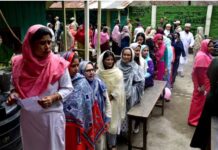Past Monday (May 21) a group of people, ostensibly US based supporters of the current opposition party in Bangladesh, held a demonstration before the White House complete with banners claiming that democracy and freedom were at risk in Bangladesh. I do not know if the organizers expected an immediate phone call from the White House to the Bangladesh Prime Minister to raise any alarm; but the passers-by were amused by yet another gathering of motley protesters in front of the White House.
A few days before another group of US based Bangladeshis, supporters of the government party, met in a gathering in New York to honor a visiting Bangladeshi MP (government party) where speakers termed current actions of the opposition as a deep conspiracy to overthrow the government. Fortunately there was no gathering of the opposition loyalists nearby, or there could have been a showdown. Interestingly, this meeting took place on the heels of a meeting by the opposition loyalists in the same city in honor of a visiting opposition leader where the government was accused of taking oppressive and heavy handed actions against the opposition.
Earlier this month the government party loyalists met in a delegation to a US Congressman, who happens to be the chair of Bangladesh Caucus in the Congress. The occasion was used by the delegation as reported to the press to express its concern on possible return to politics of Bangladesh by some individual suspected of corruption. No sooner this visit ended the other group belonging to the opposition met the same Congressman in a separate delegation to give him their side of concerns. I do not know if the two visits enlightened the Congressman on the current state of politics of Bangladesh, or left him further confused.
Protest and counter protest meetings by loyalists of both parties based in the USA can be understood given the nature of acrimony that one party bears against another in the home country. But the party loyalists take their bickering to another level when they field demonstrations replete with slogans and banners when the leaders of any of the two parties visit here. Last year when the leader of the opposition arrived in USA, the supporters of the government party held demonstrations against her when the party loyalists gathered to greet her. Exactly the same happened when the current Prime Minister visited New York, to the extent that law enforcers had to intervene in the confrontations between the two groups of supporters. In other words we have a microcosm of political intolerance and bickering created here in the USA by transplants from back home. At least this is the image we are building for ourselves abroad.
With growth in the number of Bangladeshi population abroad, what we are witnessing also is a parallel growth in the number of branches of home based political parties—chiefly the two main parties. Every major city in the USA will invariably have local branches named after the two parties. Sometimes that is not all. Internecine quarrels for leadership would also lead to division within the party and creation of factions, each claiming that it has the blessing of the leader of its party. There are full page advertisements in Bengali tabloids published locally announcing meetings and counter meetings of the factions. What is most puzzling is that our national leaders openly patronize these local branches, and attend gatherings held in their honor. I wonder if they think that the US is an extended constituency for them, and the US based loyalists are their party workers who will deliver them crucial votes.
No other country in South Asia has such a plethora of branches of home based political parties abroad except Bangladesh. To my knowledge the Indian Congress has an Overseas Association in the USA, and so has Bharatiya Janata Party. But the main purpose of these Associations is to lobby for Indian national causes with US Congress and US private sector. Pakistan also has very centralized US Associations of the two main political parties back home to pursue similar objectives. It is only in the case of Bangladesh citizens abroad that we see associations by the dozen for one or the other of the two major parties, created with only objective—to fight each other over issues back home.
Many years ago a political leader of Bangladesh who had held high office during Bangabandhu’s time came on a private visit to the USA. The political leader’s party was out of power that time. A group of people, who had set up a local branch of the party came to see the political leader and asked him to attend a gathering. The political leader declined to attend, and advised them that they (the supporters) could better support the cause of Bangladesh by involving themselves in US politics, and joining public office in the localities they live.
I wish our Bangladeshi population here could adhere to the sane advice of a political leader from their own country. I wish they would stop mimicking the perfidious and dishonest politics at home, and stop creating microcosms of national politics abroad. If we want to enter politics there are better ways to do so and this can start by helping the localities where we live. If we want to serve the country that we have left behind, there are better ways to do so. This can start by creating a better image about ourselves abroad.
———————–









